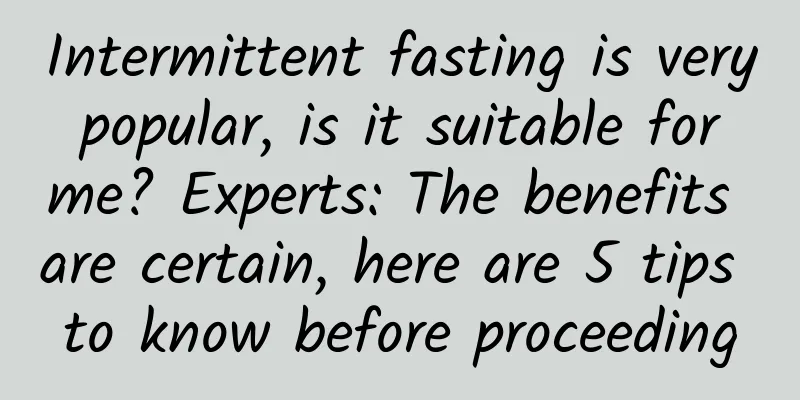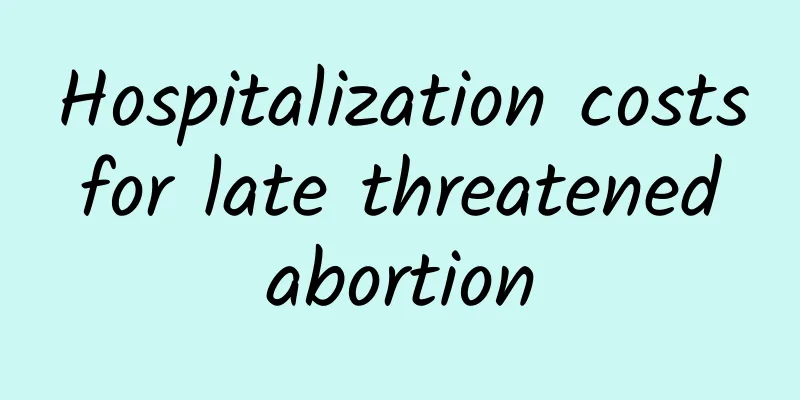Intermittent fasting is very popular, is it suitable for me? Experts: The benefits are certain, here are 5 tips to know before proceeding

|
● Even if you eat less, if you distribute it evenly into three meals a day or even more, you cannot achieve the same effect as intermittent fasting. ● 168 fasting allows you to not have to worry about calculating calories, but simply use time to control your eating and fasting rhythm. ● Intermittent fasting also produces a large amount of ketone bodies, which in turn helps to lose weight, improve blood lipids, lower blood pressure, improve inflammation index, and free radicals. Calorie restriction vs intermittent fasting In the 1930s, biologists discovered that reducing the calorie intake of laboratory mice by about 30% to 60% could extend the mice's lifespan by about 30% to 60%. Then a wave of enthusiasm arose in the academic community, and research began on experimental animals, other primates, and humans to study the effects of caloric restriction on health, chronic diseases, and life expectancy. The results of studies are very consistent, showing that limiting calorie intake can extend the lifespan of organisms including yeast, fruit flies, roundworms, laboratory mice (including rats and mice), and macaques. In addition, eating less is also beneficial to human health. However, in the last century, human understanding of food intake and health was mainly limited to limiting calorie intake and the subsequent series of wonderful physiological changes, including less free radical damage and less aging. As relevant research progressed, scientists gradually realized that what really matters is the time when animals fast outside of eating times. This has led to the focus of academic research in this century on the physiological responses during fasting and the various health benefits it brings. Extending the time without eating is called intermittent fasting, which is the main topic of this article and should not be confused with restricting calories. In other words, even if you eat less, if you distribute it evenly into three meals a day or even more, you cannot achieve the same effect as intermittent fasting. Both eating habits are good for health, but academic circles generally find that intermittent fasting is more helpful to health. So, let's focus on the discussion of time (how long you were hungry) rather than calories (how many calories less you ate). What happens to your body when you're hungry? I mentioned in my article about the ketogenic diet (page 55) that when the glycogen in the body is used up and the body is in a state of extreme glucose deficiency, it will turn to metabolizing fatty acids in the body. Those fatty acids that enter the liver are metabolized into three types of ketone bodies. These ketone bodies can not only be used by most cells in the body as an energy source. They also have very strong signals of their own that can turn on many "switches" in the body that are otherwise closed when we eat or sit for a long time. Intermittent fasting, like the ketogenic diet, will produce a large number of ketone bodies to turn on these switches. These switches are actually several transcription factors or proteins in the cells, just like the switches in our cells, which control the turning on or off of specific genes, including: FOXOs, PGC1α, NRF2, AMPK, and SIRTs. However, some proteins and hormones become less active or shut down due to fasting, including IGF-1 and mTOR. Under the influence of the above-mentioned multiple switches (some are on, some are off), our bodies will show better resistance to stress, protein synthesis will decrease, white blood cells will begin to engulf waste cells and tissues in the body, and mitochondria will begin to increase. Overall, the body's cells go into survival mode. All of the above will eventually help the human body to undergo the following changes, including: increased insulin sensitivity (blood sugar levels will improve in some diabetics as a result), weight loss, improved blood lipids, lower high blood pressure, lower inflammation index, lower free radicals (both are factors that promote arteriosclerosis), increased heart rate variability (indicating stronger heart function), etc. It can even inhibit tumor growth and prolong the survival rate of certain cancer patients, improve their quality of life, increase the tumor's response to chemotherapy or radiotherapy, improve the symptoms and respiratory inflammation of asthma patients, and relieve the symptoms of autoimmune patients. Experience with intermittent fasting There are currently two most widely studied intermittent fasting methods, called the "5:2 fasting method" and the "168 fasting method." The so-called 5:2 fasting method means picking out two days a week to eat very few calories, and the other five days are normal eating days. Generally, experts recommend gradually reducing the calorie intake over the next two days from 1,000 calories per day at the beginning, with the goal of reducing it to 500 calories. The 168 fasting method means spending only 8 hours a day eating and not consuming calories for the other 16 hours. Of these two methods, the latter has the most scientific data to support it. The more professional name for the 168 fasting method is time-restricted feeding. As the name suggests, it allows you to not have to bother calculating calories, but simply use time to control your eating and fasting rhythm. After all, everyone may have a different understanding of 500 calories. If you consume more than that, you won’t get the expected effect. I personally recommend the 168 fasting method. On the one hand, you don’t have to calculate calories. On the other hand, it is closer to the lifestyle of most of us and is easier to stick to. For example, you can delay your breakfast until 10 a.m. and then find a way to finish dinner before 6 p.m. This is possible as long as you slightly adjust your lifestyle. I currently do the "168 fasting method" about a quarter of the days in a month, but I use a 204 rhythm, which means I will fast for 20 hours and then spend 3 to 4 hours in the evening to eat a longer dinner. The reason for this is that dinner allows me to slow down, eat more nutritious food, and is less likely to affect my interpersonal relationships. After all, most gatherings are scheduled for dinner, and at lunchtime I only drink a little water or coffee (I will get my friends' understanding beforehand). Tips and reminders for intermittent fasting Here, I would like to share with you some suggestions and reminders about intermittent fasting: 1. Be sure to supplement salt: it is best to use sea salt, rose salt and other salts that contain minerals other than sodium and potassium. Lack of ions other than sodium and potassium, such as calcium and magnesium, can cause heart arrhythmia in severe cases. 2. Appropriate supplementation of multivitamins: Supplementation of multivitamins helps keep the important functions of the body functioning continuously. The trace elements in them can also help the physiological effects of fasting, making them more complete. 3. Be sure to maintain moderate exercise: take a walk or go to the gym to do some mild weight training or aerobics. Don't stay still or sit for a long time just because you are fasting, otherwise it will offset the benefits of fasting. A retrospective article published in Cell Metabolism in 2018 mentioned that the benefits of fasting will be offset by long-term sitting. 4. Drink black coffee to suppress appetite: If you can drink black coffee, I think it is a good way to suppress appetite. I find that black coffee helps me think more clearly while fasting, but be careful not to drink too much and have side effects. 5. Be cautious when fasting for more than 72 hours: There are indeed some theories that mention that such a longer fast can trigger some effects that cannot be seen in short-term fasting, and even claim that it can make you younger. I have done several 96-hour fasts myself, and I found that blood ketone levels only rise significantly after about 24 to 36 hours, and then they keep rising. However, this type of fasting is more challenging after all, and the lack of trace elements and minerals may also bring risks, so my advice is to have your doctor conduct a professional evaluation before implementing it. Before adopting agricultural life, our ancestors lived a life of gathering and hunting. During times of food scarcity, they needed more physical activity to find energy sources, and fasting periods could last for days or even weeks. This means that longer-term fasting will not lead to the extinction of humanity. In short, the benefits of intermittent fasting far outweigh the disadvantages, so let us live the lifestyle of our ancestors and activate those ancient self-healing genes. Doctors must know! Is it better to fast longer? Now that fasting has been established to have many health benefits, shouldn’t we just go without food for several days to double the benefits? The medical community has long thought of this problem and has done a lot of research to explore what happens when the human body fasts for more than 72 hours, or even for several weeks. Let’s take a look at some interesting studies. First, a group of German researchers asked 30 women, 12 of whom had metabolic syndrome, to undergo a mild fast for 7 days. The subjects were allowed to drink some tea or organic vegetable and fruit juice, but the daily calorie intake was controlled at 200 to 300 calories. After the experiment, it was found that the average weight and blood pressure of all subjects had decreased, and the systolic blood pressure even dropped by 16 mmHg. It is generally believed clinically that one antihypertensive drug can lower systolic blood pressure by 10 mmHg, so this is equivalent to the power of one and a half antihypertensive drugs. In addition, the subjects' blood levels of low-density lipoprotein cholesterol, leptin and insulin were significantly reduced, while adiponectin (responsible for regulating energy metabolism and anti-inflammatory), leptin receptors and a hormone called resistin increased. It’s important to note that this hormone, called resistin, increases the body’s bad cholesterol and inflammation, and is associated with obesity and insulin resistance, which are some of the more negative numbers in this study’s findings. The same group of German researchers followed up with a larger study in early 2019. This time they studied 1,400 subjects and conducted ultra-long fasting for 4 to 21 days, using the same diet as before. The results once again showed that weight and waist circumference would gradually decrease as the number of fasting days increased, while blood pressure would decrease on the fifth day of fasting and then maintain a stable number. As many as 93% of the subjects felt that they were not troubled by hunger during fasting, and 84% felt that various existing physical symptoms were improved due to this period of fasting. However, from a safety standpoint, I would not recommend such a long fast to promote health, especially since the study also found the adverse effect of increased resistin. At present, "intermittent fasting" is generally recommended by the medical community. This article is from New Naturalism "The Emergency Department Physician's Timeless Health Method: Being Busy and Staying Healthy Are Not Conflicting, for everyone who has no time! 》 |
>>: Never lose weight alone! Sisters are powerful, Vivian Hsu shares hilarious weight loss tips
Recommend
Common symptoms of pelvic inflammatory disease should be taken seriously by people
In recent years, the incidence of pelvic inflamma...
Healthy and slim! 4 nutritious diet recipes for weight loss
These four nutritious weight loss recipes are des...
What should I do if my menstrual flow is very light?
What should I do if my menstrual flow is very lig...
What is the best ointment for vulvar leukoplakia and how to use it?
Vulvar leukoplakia can be treated with dexamethas...
What harm will cervicitis bring to women? How should women prevent cervicitis?
Everyone knows that many female friends now suffe...
Will cervical warts have an adverse effect on the fetus?
Once you are infected with cervical warts, you sh...
Can cervical precancerous lesions be treated with medicine?
Everyone is familiar with cervical precancerous l...
What foods can cause miscarriage during early pregnancy? Stay away from these 7 foods
Diet during pregnancy is very important for pregn...
Can I take fluconazole if my vaginitis relapses two days after I got the HPV 9-valent vaccine?
If vaginitis recurs two days after receiving the ...
Can I do yoga with endometriosis?
We all know that the onset of endometriosis is no...
What is the best soup for people with uterine fibroids?
What should I put in chicken soup with uterine fi...
What are the main symptoms of cervicitis in women? There are three main symptoms of cervicitis in women.
Cervicitis is the most common type of inflammatio...
Cervical precancerous lesions screening
According to doctors, popularizing anti-tumor kno...
Cost of treating a minor threatened miscarriage
Many pregnant mothers become nervous when they ex...
To avoid rapid aging and obesity, your body needs "this" fuel! 4 tips to start ketosis and fat burning
If you don’t want to age quickly and gain weight,...









